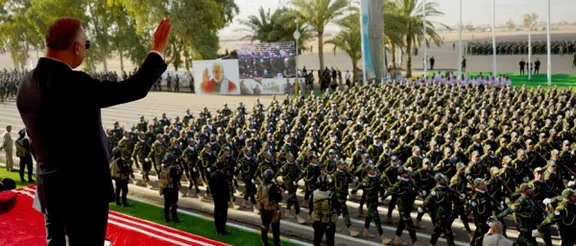Tehran University Students Oppose Admission Of Iraqi Militias

A group of students from Tehran University has expressed opposition to the admission of Iraq’s Hashd al-Shaabi militia forces as students.
In a statement issued on Thursday, the student activists said they would not accept “military forces, whether in combat or school uniforms, within the university premises".
Vowing to resist their presence, which many fear is an attempt to suppress dissidents in the institution, they said that the university’s atmosphere is already poisoned due to the presence of professors affiliated with the regime and Basij militiamen masquerading as students. They accused the authorities of sidelining students by suspending, removing, and suppressing them, while replacing them with borrowed forces from Iraq.
The activists lamented the university's transformation from a symbol of academic independence to a mere instrument of military tyranny, stating, “The presence of these individuals as university administrators only perpetuates a cycle of crises and disasters. Today, we realize that within the minds of those in power, we are denied the right to study and even the right to exist."
In contrast, the student activists highlighted the plight of imprisoned, expelled, and suspended students, who find themselves unjustly excluded for voicing grievances against the regime, while Hashd al-Shaabi forces gain admission.

Al-Hashd al-Shaabi was established back in 2014, following a fatwa to fight ISIS, which controlled four governorates and reached the borders of the capital Baghdad at the time. The Iraqi state-sponsored umbrella organization is composed of approximately 67 different armed factions, with around 128,000 fighters that are mostly Shia Muslim groups, but also include Sunni Muslim, Christian, and Yazidi groups.
Tehran University's public relations office announced members of Iraq's Shiite Hashd al-Shaabi militias and other proxies of the Islamic Republic can study at Iranian universities following a meeting attended between the head of Supreme Leader Ali Khamenei's representatives at the universities and the education deputy of Hashd al-Shaabi.
It has caused outrage among students who also criticized the advantages enjoyed by regime-affiliated students and the rich as well as entrance exam biases, which have discouraged many talented and hardworking individuals from pursuing higher education.
Students hailing from the wealthiest families, and those affiliated with IRGC’s Basij forces as well as those whose family members are war veterans, or what regime calls "martyrs”, have a much greater chance of admission to top universities in Iran, prompting many to blame corruption by the entrance exam ‘mafia’.
The Tehran University students’ statement also emphasized the disparity between the easy entry of members from Hashd al-Shaabi and the obstacles faced by socially and politically marginalized groups within Iranian society. They argued that the university administration's prioritization of military forces over ordinary people and dissidents undermines the principles of equal educational opportunities.
The student movement has played a significant role in the formation and continuation of last year's popular protests, sparked by the death of a 22-year-old woman, Mahsa Amini, in morality police custody. In recent weeks, security forces in Iran have unleashed a fresh wave of crackdowns at universities employing both verbal and physical assault to suppress the student movement.